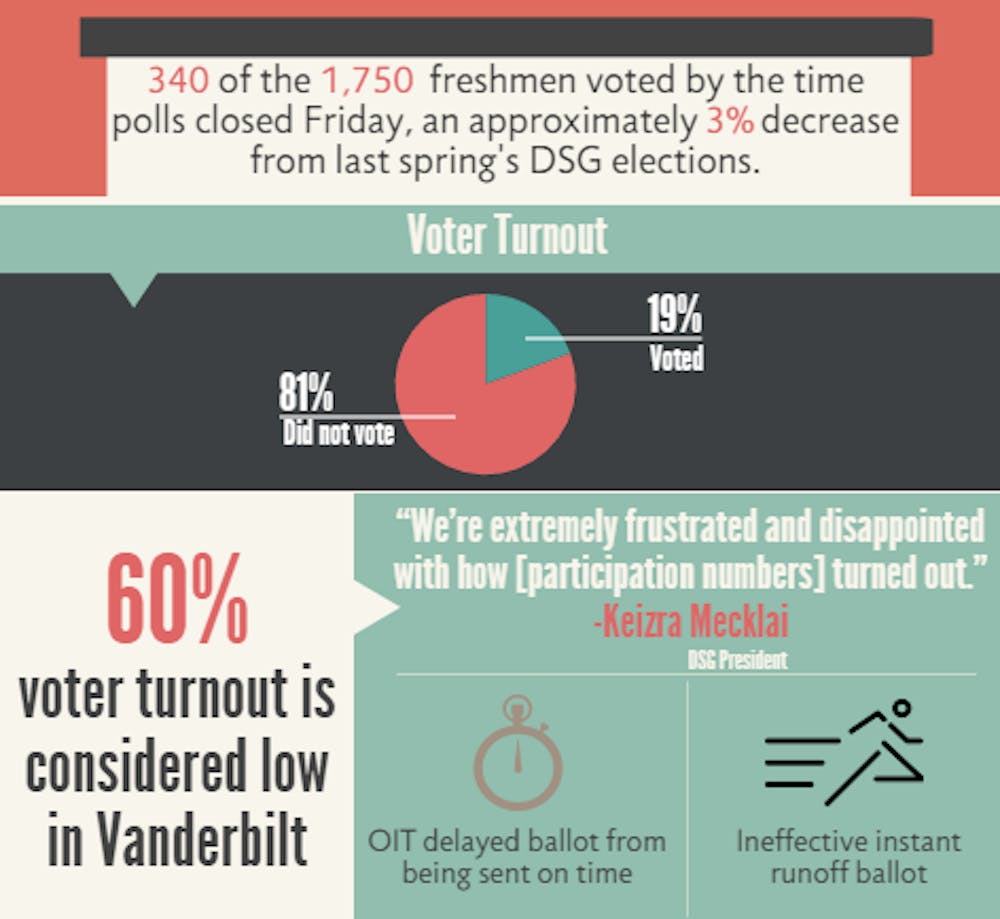Despite Duke Student Government’s goal of increasing voter turnout for this week’s freshman senator elections, only approximately 20 percent of the Class of 2019 voted.
The election, which saw 12 senators elected, was accompanied by campaigns on social media and in Marketplace run by DSG members to increase participation among voters. 340 of the 1,750 freshmen voted by the time polls closed Friday, an approximately three percent decrease from last spring’s DSG elections and a disappointing clip for DSG exec, explained DSG President Keizra Mecklai, a senior.
“We’re extremely frustrated and disappointed with how [participation numbers] turned out,” Mecklai said.
In the election, Kushal Kadakia and Chip Robert Sterm were elected as senators for academic affairs, Jackson Dellinger and Stuart Ki were elected as senators for Durham and regional affairs, Alec Lintz and Kabou Yengo-Passy were elected as senators for equity and outreach, Jason Chang was elected senator for facilities and the environment, Robert Rappleye and Kevin Bhimani were elected as senators for residential life, Kristina Smith and William Hardee were elected as senators for services and Isabella Letourneau was elected senator for social culture.
Vice President for Residential Life George Mellgard, a junior—who helped to organize the campaigns to increase turnout—had compared Duke’s student government participation to Vanderbilt’s, where 60 percent voter turnout was considered low. His campaign focused on bringing information about elections to voters by talking to freshman and campaigning on Facebook, rather than having voters seek it out themselves. However, the ballot itself proved to be one of the biggest challenges DSG faced.
“A great lesson we learned was just how much trouble the instant runoff voting system gives people, especially those people who haven’t used it before,” Mellgard said. “The instant runoff system works if you’re an educated voter, but given the size of the school and the number of candidates, the current system became incredibly ineffective.”
The instant runoff system requires that voters list all candidates for a position and nullifies the ballot if fewer than all candidates are ranked.
Mecklai said that DSG will be investigating alternative ballot styles for future elections.
“Something we’re going to work on moving forward is seeing if we can modify the instant runoff system so that we can have just one vote per student or the number of votes per number of open positions,” she explained.
Another problem was a miscommunication between University Center of Activities and Events and the Office of Information Technology, which prevented the ballot from being sent out on time, shortening the original 24-hour window by approximately four hours. Rather than being held from noon Thursday until noon Friday, the ballot was only available starting late Thursday afternoon.
The idea of a 24-hour window across two days was also a shift from previous elections, which were open during only one day from early in the morning until 10:00 p.m.
DSG Attorney General Robin Zhang, a senior, said future elections would still be held at the same time so that technical difficulties could be easily resolved during UCAE’s operating hours when polls closed.
Despite the difficulties with voting, Mecklai welcomed the freshman senators to DSG.
“I am so excited to see their enthusiasm, their questions, and their campaign platforms,” she said. “I’m ready to welcome them to our Senate and give them opportunities to make the change on campus that they’ve been talking and campaigning about over the last couple weeks.”
Get The Chronicle straight to your inbox
Signup for our weekly newsletter. Cancel at any time.

